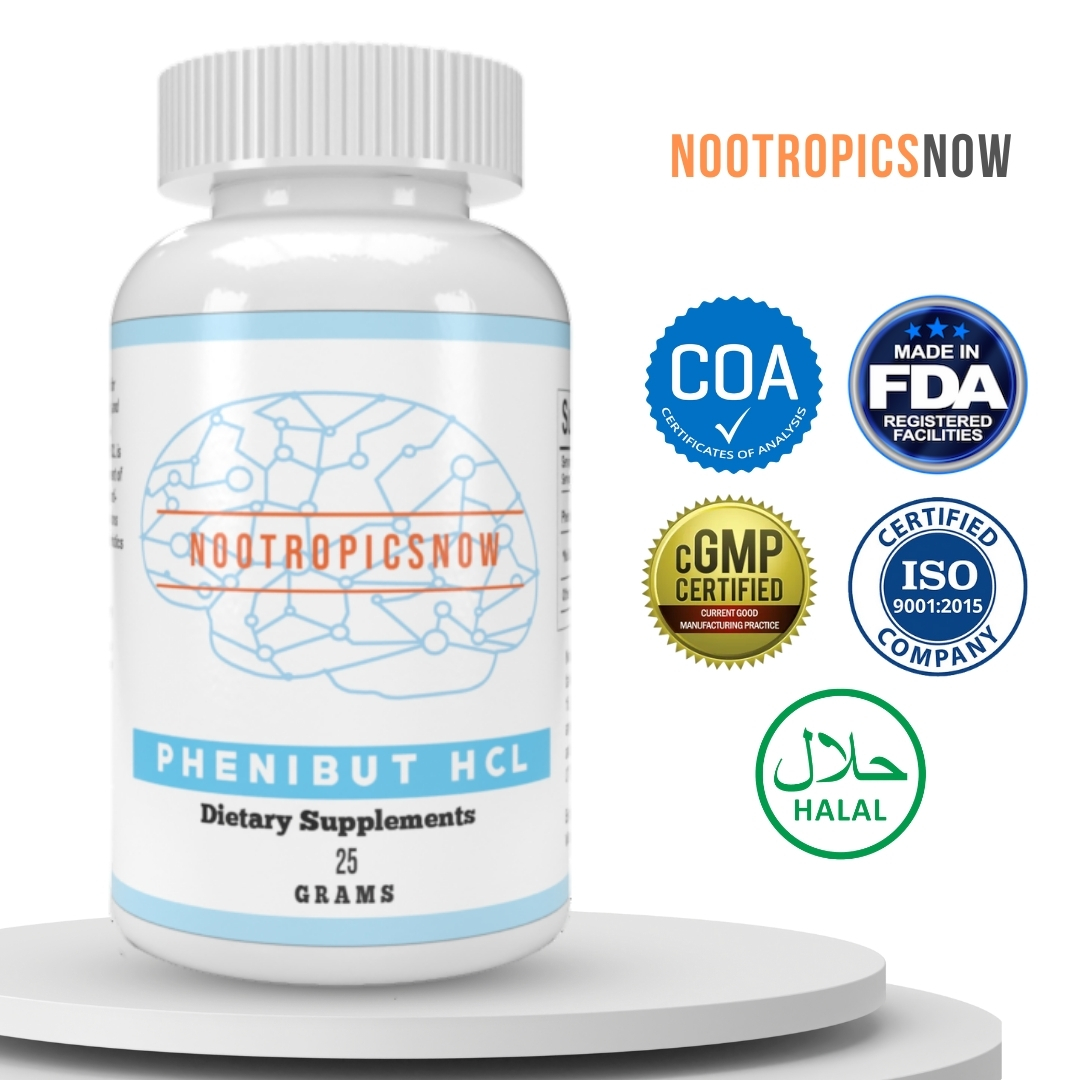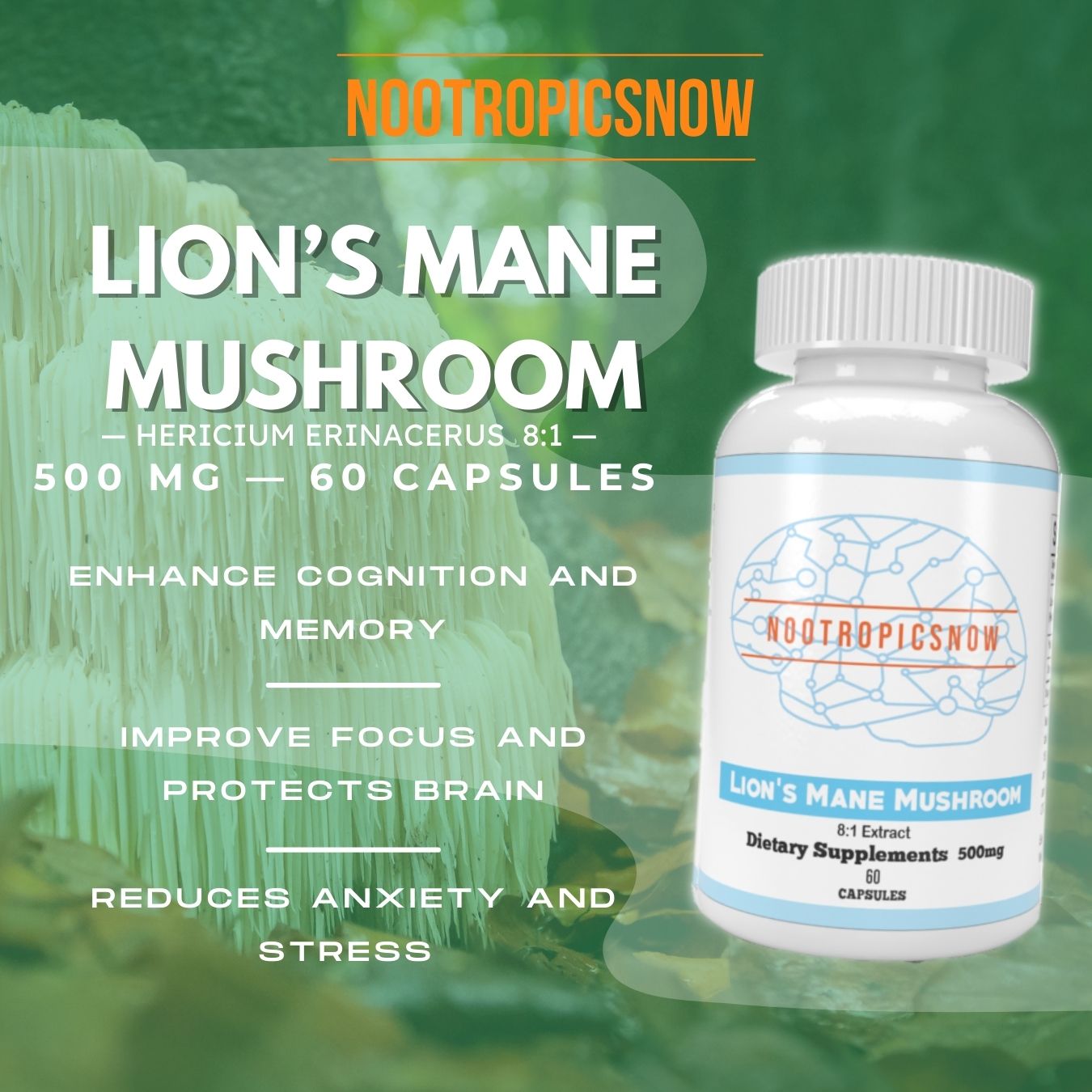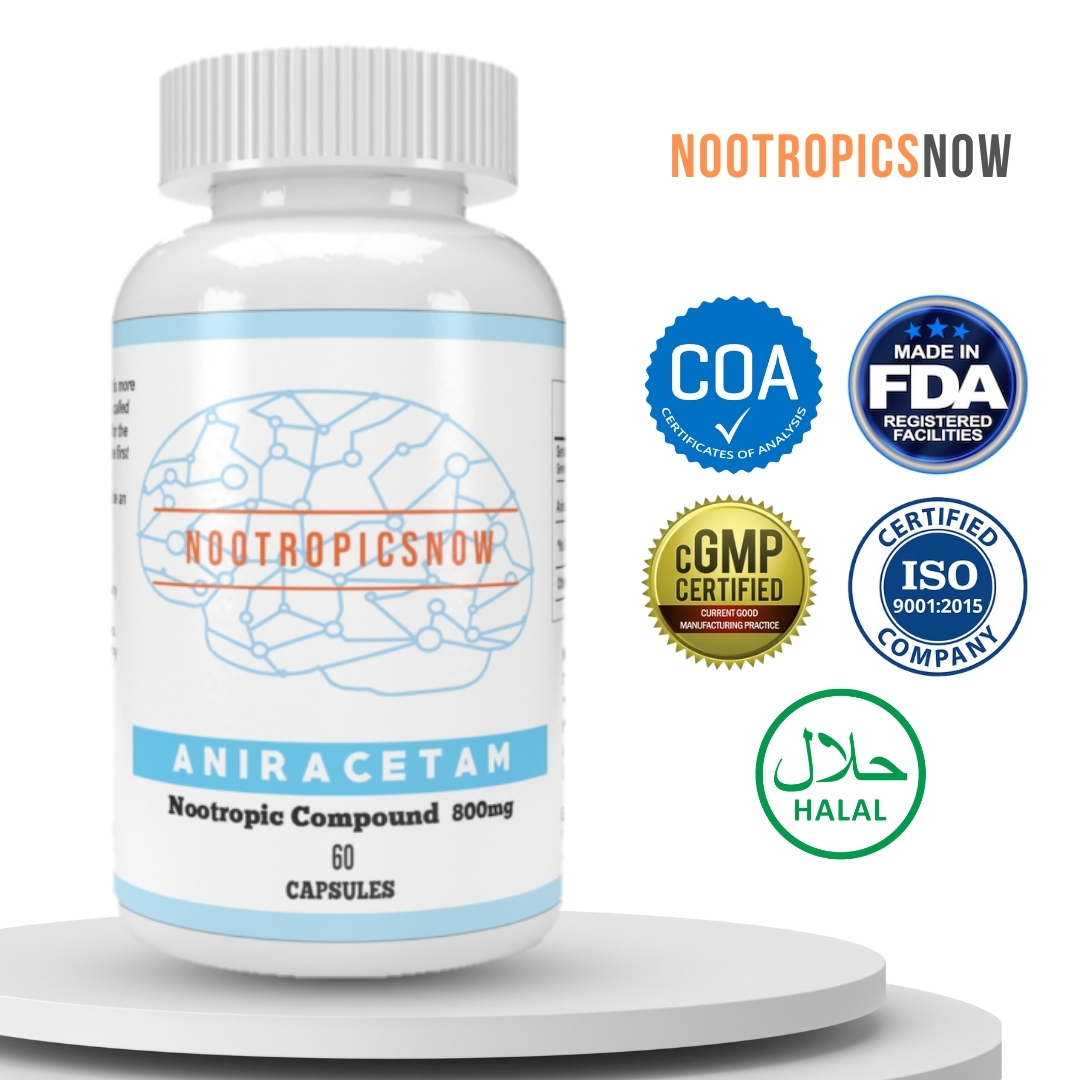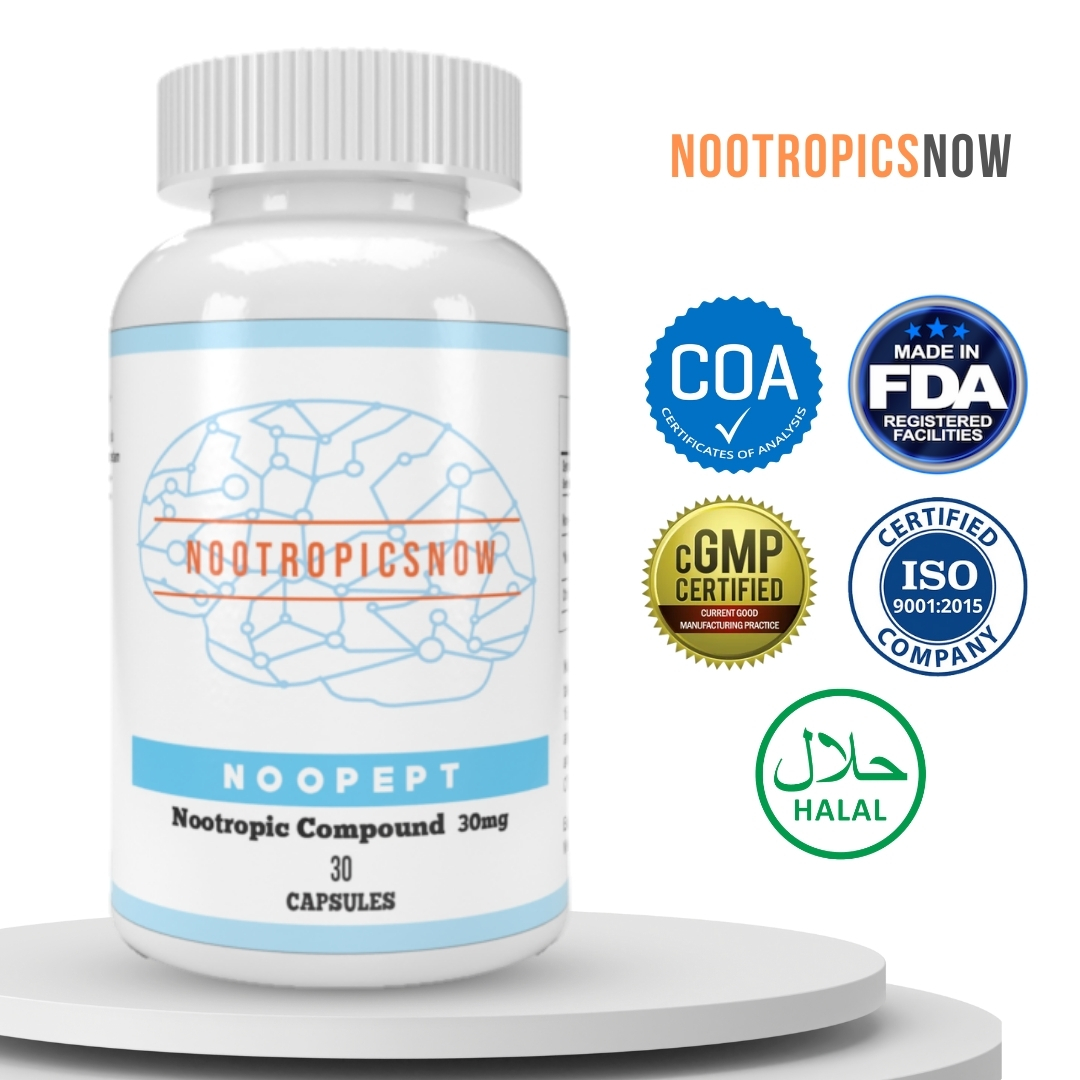Phenibut HCL: Boost Cognitive Function?

`markdown
Phenibut HCl for Cognitive Improvement: Unveiling the Truth
Phenibut HCl, or β-phenyl-γ-aminobutyric acid hydrochloride, has garnered attention as a potential cognitive enhancer and anxiolytic agent. While anecdotal reports and some preliminary studies suggest benefits for focus, memory, and anxiety reduction, a comprehensive understanding necessitates a critical examination of the available scientific evidence. This section delves into the multifaceted relationship between Phenibut HCl and cognitive function, evaluating its mechanisms, potential benefits, associated risks, and responsible usage strategies.
Understanding Phenibut HCl: A Brief Overview

Phenibut is a derivative of the naturally occurring inhibitory neurotransmitter gamma-aminobutyric acid (GABA). Its structure includes a phenyl ring, allowing it to cross the blood-brain barrier more readily than GABA itself. This enhanced bioavailability is what makes Phenibut capable of exerting effects within the central nervous system, where it interacts primarily with GABA-B receptors.
The Mechanism of Action: How Phenibut Works in the Brain
Phenibut’s primary mode of action involves binding to GABA-B receptors, acting as an agonist. GABA-B receptors are metabotropic receptors that, upon activation, initiate a cascade of intracellular signaling events. These events lead to the opening of potassium channels and the closure of calcium channels, resulting in hyperpolarization of the neuron and a subsequent reduction in neuronal excitability.
Beyond its GABA-B receptor activity, Phenibut also influences dopamine levels, particularly at lower doses. This modulation of dopamine contributes to its reported mood-enhancing and motivating effects. However, the precise interplay between GABAergic and dopaminergic pathways remains an area of ongoing research.
Distinguishing Phenibut HCl from Other Nootropics
Unlike many other nootropics that primarily enhance excitatory neurotransmission (e.g., racetams, stimulants), Phenibut primarily modulates inhibitory processes. This distinction is crucial, as it offers a different approach to cognitive enhancement. By reducing excessive neuronal firing and promoting a state of calm focus, Phenibut can potentially improve concentration and reduce mental noise. This is where Phenibut stands out among other synthetic and natural cognitive enhancers.
Potential Cognitive Benefits of Phenibut HCl
The anecdotal evidence surrounding Phenibut HCl suggests a range of cognitive benefits. These benefits are supported, to varying degrees, by limited research and warrant further investigation.
Enhanced Focus and Concentration
Many users report improved focus and concentration after taking Phenibut HCl. This effect is likely due to its ability to reduce anxiety and mental distractions. By calming the mind and reducing the interference of anxious thoughts, Phenibut can create a more conducive environment for focused attention.
Improved Memory and Learning
Some studies suggest that Phenibut can enhance memory and learning, particularly in stressful situations. This effect may be related to its ability to reduce anxiety and improve sleep quality, both of which are crucial for cognitive function. Rodent studies have suggested improvements in memory consolidation when administering Phenibut. However, more human studies are necessary.
Reduced Anxiety and Stress
One of the most well-documented effects of Phenibut HCl is its anxiolytic properties. By activating GABA-B receptors, Phenibut can reduce neuronal excitability and promote a sense of calm. This can be particularly beneficial for individuals experiencing anxiety or stress-related cognitive impairments.
Mood Enhancement and Motivation
Some users report that Phenibut HCl enhances their mood and motivation. This effect may be related to its influence on dopamine levels. By increasing dopamine release, Phenibut can promote feelings of pleasure and reward, which can enhance motivation and drive.
Improved Sleep Quality
Phenibut HCl is often used as a sleep aid. By promoting relaxation and reducing anxiety, Phenibut can improve sleep quality and duration. Adequate sleep is crucial for cognitive function, and improved sleep can indirectly contribute to cognitive enhancement.
The Dark Side: Risks and Side Effects of Phenibut HCl
While Phenibut HCl offers potential cognitive benefits, it also carries significant risks and side effects. Understanding these risks is essential for making informed decisions about its use.
Tolerance and Dependence
One of the most significant risks associated with Phenibut HCl is the development of tolerance and dependence. With regular use, the brain adapts to the presence of Phenibut, requiring higher doses to achieve the same effects. This can lead to a vicious cycle of increasing dosage and escalating dependence.
Withdrawal Symptoms
Abrupt cessation of Phenibut HCl after prolonged use can lead to severe withdrawal symptoms. These symptoms can include anxiety, insomnia, agitation, depression, panic attacks, and even seizures. The severity of withdrawal symptoms depends on the dosage, duration of use, and individual susceptibility.
Cognitive Impairment at High Doses
While low doses of Phenibut HCl may improve cognitive function, high doses can have the opposite effect. High doses can lead to sedation, confusion, impaired coordination, and reduced cognitive performance.
Interactions with Other Substances
Phenibut HCl can interact with other substances, particularly those that also affect the central nervous system. Combining Phenibut with alcohol, benzodiazepines, or other sedatives can increase the risk of respiratory depression, coma, and death.
Other Side Effects
Other potential side effects of Phenibut HCl include drowsiness, dizziness, nausea, headache, fatigue, and gastrointestinal disturbances. Some users also report experiencing paradoxical effects, such as increased anxiety or agitation.
Responsible Usage Strategies for Phenibut HCl
Given the potential benefits and risks of Phenibut HCl, responsible usage strategies are crucial. These strategies aim to maximize potential benefits while minimizing the risk of adverse effects.
Start with a Low Dose
If you choose to use Phenibut HCl, it is essential to start with a low dose. A typical starting dose is around 250-500 mg. It is crucial to assess your individual response to the drug before increasing the dosage.
Use Infrequently
To minimize the risk of tolerance and dependence, Phenibut HCl should be used infrequently. A common recommendation is to use it no more than once or twice per week.
Avoid Daily Use
Daily use of Phenibut HCl is strongly discouraged. Daily use significantly increases the risk of tolerance, dependence, and withdrawal symptoms.
Cycle Your Use
Cycling your use of Phenibut HCl can help to prevent tolerance. This involves taking Phenibut for a set period (e.g., one to two weeks) followed by a period of abstinence (e.g., one to two weeks).
Avoid Combining with Other Substances
To minimize the risk of adverse interactions, Phenibut HCl should not be combined with alcohol, benzodiazepines, or other sedatives.
Taper Gradually
If you have been using Phenibut HCl regularly, it is essential to taper your dosage gradually when discontinuing its use. Abrupt cessation can lead to severe withdrawal symptoms. A gradual taper allows the brain to adapt to the absence of Phenibut, minimizing the risk of withdrawal.
Seek Professional Advice
If you are considering using Phenibut HCl, it is advisable to seek professional advice from a healthcare provider. A healthcare provider can assess your individual risk factors and provide personalized recommendations.
Exploring Alternatives to Phenibut HCl for Cognitive Enhancement
Given the risks associated with Phenibut HCl, exploring alternative nootropics may be a safer and more sustainable approach to cognitive enhancement. Several natural and synthetic nootropics offer cognitive benefits with a lower risk of adverse effects.
Natural Nootropics
Synthetic Nootropics
Conclusion: A Balanced Perspective on Phenibut HCl and Cognitive Enhancement

View Product
Phenibut HCl presents a complex picture of potential cognitive benefits and significant risks. While it may offer advantages in terms of focus, memory, anxiety reduction, and mood enhancement, its potential for tolerance, dependence, withdrawal, and adverse interactions necessitates a cautious and informed approach. Responsible usage strategies, including low doses, infrequent use, and avoidance of combinations, are crucial for minimizing the risk of adverse effects. Furthermore, exploring alternative nootropics with a lower risk profile may be a safer and more sustainable approach to cognitive enhancement. Ultimately, the decision to use Phenibut HCl should be made in consultation with a healthcare provider, considering individual risk factors and a thorough understanding of the potential benefits and risks.
`
Phenibut HCl and Cognitive Improvement: A Deep Dive
Phenibut HCl, also known as β-phenyl-γ-aminobutyric acid, has garnered attention for its potential to enhance cognitive function. Individuals are exploring its use, hoping to boost memory, focus, and overall mental acuity. However, the scientific evidence supporting these claims is nuanced and requires careful examination. This section delves into the various aspects of phenibut HCl and its impact on cognitive performance. We will explore its mechanism of action, purported benefits, associated risks, and existing research to provide a comprehensive overview. Understanding these details will equip individuals to make informed decisions about whether phenibut HCl is suitable for their cognitive enhancement goals. Moreover, we will address the importance of responsible usage and potential alternatives.
Unveiling the Mechanism of Action
Phenibut’s primary mechanism revolves around its role as a GABA-B receptor agonist. Gamma-aminobutyric acid (GABA) is the brain’s principal inhibitory neurotransmitter. It effectively calms neuronal activity, reducing excitability and promoting relaxation. Phenibut, being a GABA analog, structurally resembles GABA and can cross the blood-brain barrier to exert its effects within the central nervous system.
GABA-B Receptor Agonism
As an agonist, phenibut binds to GABA-B receptors, stimulating their activity. This stimulation leads to several downstream effects, including reduced release of excitatory neurotransmitters like glutamate. The overall effect is a reduction in neuronal firing and a decrease in anxiety. Scientists theorize that this calming effect, in turn, may indirectly enhance cognitive function by reducing distractions and improving focus.
Dopamine Release Modulation
Besides its action on GABA receptors, phenibut is thought to modulate dopamine release. Dopamine, a crucial neurotransmitter involved in motivation, reward, and focus, plays a significant role in cognitive performance. Some studies suggest that phenibut can increase dopamine levels, which might contribute to enhanced motivation and cognitive drive. However, the exact nature and extent of this dopaminergic effect are still under investigation. Also, the effect may depend on dosage, individual differences and duration of use.
Blood-Brain Barrier Penetration
Phenibut’s ability to cross the blood-brain barrier is critical to its effects. Many substances cannot penetrate this protective barrier, preventing them from directly influencing brain function. Phenibut’s unique chemical structure allows it to bypass this barrier, allowing it to directly interact with GABA receptors and other neurotransmitter systems within the brain.
Cognitive Benefits: Exploring the Claims
Anecdotal reports and limited research suggest several potential cognitive benefits associated with phenibut HCl. These claims include enhanced memory, improved focus, reduced anxiety, and enhanced mood. However, critically evaluating the evidence behind these claims is essential.
Memory Enhancement
Some users report improved memory retention and recall after taking phenibut. This effect may be related to the anxiolytic properties of the substance. Anxiety can impair cognitive function, including memory. By reducing anxiety, phenibut may indirectly improve memory performance. However, direct evidence supporting a memory-enhancing effect of phenibut, independent of its anxiolytic effects, is scarce.
Focus and Concentration
Phenibut is sometimes used to enhance focus and concentration. Users claim that it helps them to stay on task and improve productivity. This perceived benefit may be due to its ability to reduce distractions and promote a state of calm alertness. However, higher doses could cause sedation, impairing focus instead.
Anxiety Reduction
Anxiety reduction is one of the most commonly cited benefits of phenibut. By acting as a GABA-B receptor agonist, it reduces neuronal excitability, leading to a calming effect. This anxiety reduction may improve cognitive function by allowing individuals to focus better and perform more effectively under pressure.
Mood Enhancement
Some users also report mood-enhancing effects with phenibut. This might be attributed to its modulation of dopamine levels, leading to increased feelings of pleasure and motivation. However, these mood-enhancing effects can be inconsistent and might not be experienced by everyone.
Risks and Side Effects: Proceeding with Caution
While phenibut may offer certain cognitive benefits, it’s crucial to acknowledge and understand the potential risks and side effects associated with its use. These risks include tolerance, dependence, withdrawal symptoms, and adverse interactions with other substances.
Tolerance and Dependence
Tolerance to phenibut can develop rapidly with regular use. This means that individuals need to take increasingly higher doses to achieve the same effects. Over time, this can lead to physical dependence, where the body adapts to the presence of phenibut and requires it to function normally.
Withdrawal Symptoms
Discontinuing phenibut after prolonged use can result in severe withdrawal symptoms. These symptoms can include anxiety, insomnia, agitation, depression, and cognitive impairments. In severe cases, withdrawal can even lead to seizures. Due to this severity, users must exercise caution and taper off of phenibut in a planned manner under supervision of a health professional.
Adverse Interactions
Phenibut can interact negatively with other substances, particularly those that also affect the central nervous system. Combining phenibut with alcohol, benzodiazepines, or opioids can increase the risk of sedation, respiratory depression, and overdose.
Other Side Effects
Other potential side effects of phenibut include drowsiness, dizziness, nausea, headaches, and impaired motor coordination. These side effects can vary in severity and may depend on the dosage and individual sensitivity.
Dosage Considerations: Finding the Right Balance
Finding the right dosage of phenibut is crucial to minimize the risk of side effects and maximize potential benefits. Dosage recommendations typically range from 250 mg to 1500 mg per day, but individual needs and sensitivities can vary.
Starting Low
It’s generally recommended to start with a low dose of phenibut, such as 250 mg, and gradually increase the dose as needed. This allows individuals to assess their sensitivity to the substance and minimize the risk of side effects.
Limiting Frequency
To prevent tolerance and dependence, it’s essential to limit the frequency of phenibut use. Many users recommend taking phenibut no more than two or three times per week. This helps to prevent the body from adapting to the substance and reduces the risk of withdrawal symptoms.
Avoiding High Doses
High doses of phenibut can increase the risk of side effects and withdrawal symptoms. It’s generally recommended to avoid taking doses above 1500 mg per day.
Legal Status and Availability
The legal status of phenibut varies across different countries and regions. In some countries, phenibut is available as a prescription medication, while in others, it is sold as a dietary supplement or research chemical.
United States
In the United States, phenibut is not approved by the Food and Drug Administration (FDA) for any medical use. It is sold as a dietary supplement, but its legal status is somewhat ambiguous. The FDA has issued warning letters to companies marketing phenibut with unsubstantiated claims.
Russia
In Russia, phenibut is licensed as a prescription medication for anxiety, insomnia, and other conditions. It is also used to treat PTSD.
Other Countries
The legal status of phenibut in other countries varies. Some countries regulate it as a controlled substance, while others allow its sale as a dietary supplement.
Responsible Usage: A Key Consideration
Given the potential risks associated with phenibut use, it’s essential to practice responsible usage. Responsible usage involves understanding the risks and benefits, using phenibut in moderation, and avoiding overuse or dependence.
Consulting a Healthcare Professional
Before using phenibut, it’s recommended to consult a healthcare professional. This is especially important for individuals with underlying health conditions or those taking other medications. A healthcare professional can provide guidance on appropriate dosage, potential interactions, and safety precautions.
Avoiding Long-Term Use
Long-term use of phenibut can increase the risk of tolerance, dependence, and withdrawal symptoms. It’s generally recommended to avoid using phenibut for extended periods. If long-term use is necessary, it should be done under the supervision of a healthcare professional.
Monitoring for Side Effects
While taking phenibut, it’s important to monitor for any side effects. If any adverse effects occur, it’s recommended to discontinue use and consult a healthcare professional.
Alternatives to Phenibut HCl: Exploring Other Options
For individuals seeking cognitive enhancement without the risks associated with phenibut, several alternatives are available. These alternatives include other nootropics, lifestyle modifications, and therapies.
Other Nootropics
Several other nootropics can enhance cognitive function without the same risks as phenibut. These include:
Lifestyle Modifications
Lifestyle modifications can also significantly improve cognitive function. These include:
Therapies
Certain therapies can also enhance cognitive function. These include:
The Latest Research on Phenibut HCl
As the interest in cognitive enhancement grows, research into substances like Phenibut HCl continues to evolve. Staying updated on the most recent studies is essential for those considering its use. The current research landscape is limited but provides some valuable insights.
Emerging Clinical Trials
Clinical trials focusing specifically on phenibut’s cognitive impacts are still relatively scarce. Ongoing studies may delve deeper into its effects on focus, memory, and anxiety reduction under controlled settings. Monitoring these trials’ outcomes will be crucial in understanding the true scope of phenibut’s potential benefits and risks.
Advances in Understanding Mechanism of Action
Scientists are continuously refining their understanding of how phenibut interacts with the brain. Advances in neuroimaging and neurotransmitter analysis could reveal more about its effects on GABA receptors, dopamine pathways, and other brain systems. These mechanistic insights could pave the way for more targeted and safer cognitive enhancement strategies.
Longitudinal Studies on Long-Term Effects
Longitudinal studies are needed to assess the long-term effects of phenibut use, particularly concerning cognitive health. These studies would track cognitive performance, mental well-being, and overall health outcomes over extended periods to identify any potential risks associated with chronic phenibut exposure.
Comparative Analyses with Other Nootropics
Research comparing phenibut to other nootropics can help users make more informed choices. Comparative analyses could assess the efficacy, safety profiles, and long-term effects of phenibut relative to alternatives like L-Theanine, Bacopa Monnieri, and Lion’s Mane. This type of research would offer valuable guidance for individuals seeking cognitive enhancement options.
Conclusion: Making an Informed Decision
Phenibut HCl presents a complex picture in the realm of cognitive enhancement. While it may offer some potential benefits, such as reduced anxiety and improved focus, it also carries significant risks, including tolerance, dependence, and withdrawal symptoms. Individuals considering phenibut use should carefully weigh the potential benefits against the risks.
Responsible usage is paramount. It involves consulting with a healthcare professional, starting with a low dose, limiting frequency, avoiding long-term use, and monitoring for side effects. Exploring alternatives, such as other nootropics, lifestyle modifications, and therapies, is also essential.
Ultimately, the decision of whether to use phenibut HCl is a personal one. However, it should be based on a thorough understanding of the available evidence and a commitment to responsible usage. Continuous research and open dialogue within the scientific community are crucial to further elucidate the true potential and limitations of phenibut HCl in cognitive enhancement.










